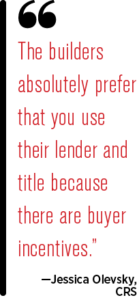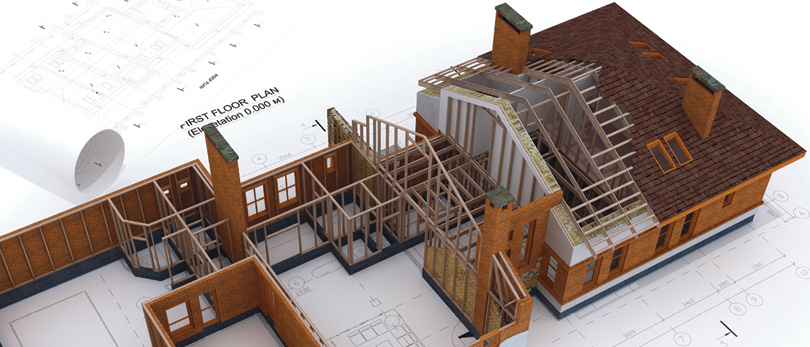New home construction can be a profitable niche for real estate professionals who are willing to dedicate the time and effort
By Myrna Traylor
Most residential real estate professionals enter the real estate field with an eye on the largest market—resales of existing homes.
However, many agents, including CRSs, are finding success in helping buyers manage the purchase of newly constructed homes. The Residential Specialist spoke with three CRSs who have worked with buyers in this sector, primarily with builders/developers (as opposed to an individual architect or custom home builder), and they all have great things to say about making this work for their business.
For those who want to add these capabilities to their service offerings, it is possible to add new home construction to your portfolio while maintaining your existing business. Eric Ravenscroft, CRS, owner of The Ravenscroft Group in Phoenix, Arizona, says he got into the sector to take advantage of an underserved market niche. “I saw it as an opportunity where there weren’t many agents partnering with builders,” he says. “New construction is always seen as much more expensive. So, I took it upon myself to learn more about it and found that a new build may be expensive up front, but when we look at the one-, five- or 20-year projections, and after considering the new technology and energy efficiencies that builders add, it isn’t actually more expensive.”
Ravenscroft embarked on an educational journey, introducing himself to builders in the area and becoming familiar with building practices and materials. “I started going to build sites, making connections with sales agents and each builder’s regional directors to find out who uses two-by-six framing versus two-by-four, which builders are using spray foam versus blown-in cellulose, and creating my own little booklet of knowledge that I can then use to educate buyers.” These sorts of details help Ravenscroft explain differences in home prices, for example. He can tell a buyer, “This is why this builder’s price is $50,000 more than this builder’s. Or this builder uses these types of windows that can translate to savings on your electric bill.”
Talking terms
Another area of buyer education that residential real estate professionals in this sector must learn is about the purchase contract because the buyer is signing a contract with the builder for the purchase. Jessica Olevsky, CRS, broker/owner at JPAR Stellar Living serving Montgomery County, Maryland, and Washington, D.C., points out why familiarity with this difference is so important. “Builder contracts are different—they definitely favor the builder. And you need to understand that timelines, overcharges and even completion dates can shift based on whatever the builder’s needs are.”
Olevsky goes on to say that builders hold all the cards in some respects. “There could also be price increases, and that’s scary. That happened during COVID [shutdowns] because builders would have 80% of the build completed and then realized, ‘Oh my gosh, I could now sell this property for $100,000 more to a new buyer.’ So, the builder would cancel and void your buyer’s contract.”
To mitigate against this, Olevsky recommends that her buyers engage an attorney who knows builder contracts and what clauses need to be amended.
From the lot to the wallpaper
Depending on the stage of construction, a CRS working with a buyer may be involved from the initial lot selection through the final close and beyond. When helping clients see things that aren’t yet built, this may be a more intensive working relationship. Diana Galavis, CRS, broker associate at Watson Realty Corp. in Jacksonville, Florida, has worked primarily in new construction for 13 years. She outlines the stages for a typical new home build.
“We will help show a buyer the development that may be right for them, and then once they narrow down the community and the neighborhood, we take a look at lots to see what is a good fit; if it’s near a preserve or a water feature, for example,” Galavis says. “Then, we need to find a house plan suited to their lifestyle that fits on that lot. Sometimes, you can’t put a larger home on a small lot and vice versa.
“Once we find a plan, we’ll see if the builder is offering any customizable options, such as bumping out walls, and what will be good for resale in the future,” Galavis explains. “I help them visualize because you’re not looking at a house—this is all on paper.”
A key relationship that the agent will manage is with the site agent, the builder’s representative who keeps agents and buyers informed on construction progress. Some site agents provide progress photos to the agent to pass along to buyers. They are also available to walk through a site with the agent who wants to check progress themselves. The site agent will also help coordinate interim inspections. “I always recommend that my customers do phase inspections,” Galavis says. Depending on your state, an inspector may need special training for new construction. Having access to a trusted professional is a must.
Closing the sale
Builders have the advantage in a seller’s market. These days, they don’t feel compelled to sweeten the deals with additional porches or upgraded finishes to make the sale. Still, a CRS can help their buyer achieve some savings if, for instance, the builder has a preferred lender or financing incentive. “Here in Phoenix, negotiations are limited in a seller’s market but are usually still available,” says Ravenscroft. “Most builders carry around 20% profit per home, so that’s a pretty large margin. I am always able to get something for buyers, and the incentives are pretty large as we get closer to the end of the year, whether it’s money off the price of the home, flex money toward closing costs, buying down the interest rate or having the backyard done. I know some that are getting a free golf cart.”

Olevsky has had similar experiences. “The builders absolutely prefer that you use their lender and title because there are buyer incentives. For example, there’s a fabulous builder that pre-buys their money from the lender six months in advance. They are buying down the mortgage rate for a buyer, so you’ll actually get a better deal from that builder than you would from one of the big lenders. Say, if the market rates today are 7.5%, that builder might be able to get you to 6.9%. That’s a big chunk of change.”
“There’s something very special about building a home—picking out the lot, being able to customize the home and helping buyers navigate that process right through to finishings and hardware,” says Galavis. “But to be honest, I like all the nitty gritty of the actual phases in the construction and knowing how important it is that buyers have representation in those phases. We’re navigating all the stuff that a typical buyer doesn’t know, like what insulation and plumbing is being installed. That’s the really cool part.”
The Value of Interim Inspections
CRSs working with buyers purchasing homes under construction will want to recommend the services of an inspector who understands the ins and outs of new builds. Jessica Olevsky, broker/owner at JPAR Stellar Living, has worked with home inspector Dan Deist, owner of Top to Bottom Services in Washington, D.C., and Maryland, and they agree that there is value in conducting inspections at key steps of construction.
If a build starts from ground zero, a foundation inspection can reveal “any bulging and any other damage from when they did the original pour or see if rebar is included,” Deist says. The next common inspection point is before the drywall goes up. “Issues are always found in the pre-drywall inspection,” says Olevsky. “Things like radon, foundation cracks that need sealing, stud wall alignments and pipe insulation, for example.”
“I’ve actually seen cases where the builder will put in studs 16 inches on center for their inspection, and then they go and knock every other one to put those materials in another property,” says Deist. He also points out that even builders with excellent reputations rely on subcontractors who may cut corners.
There are costs for each inspection, of course. “Every time you have an inspector go out, you’re paying for not only their expertise, but their time on site,” Deist says, but it is well worth the expense.
Prep for any future transaction with RRC’s education catalog, available at CRS.com/catalogsearch.
Photo: iStock.com/suprun








